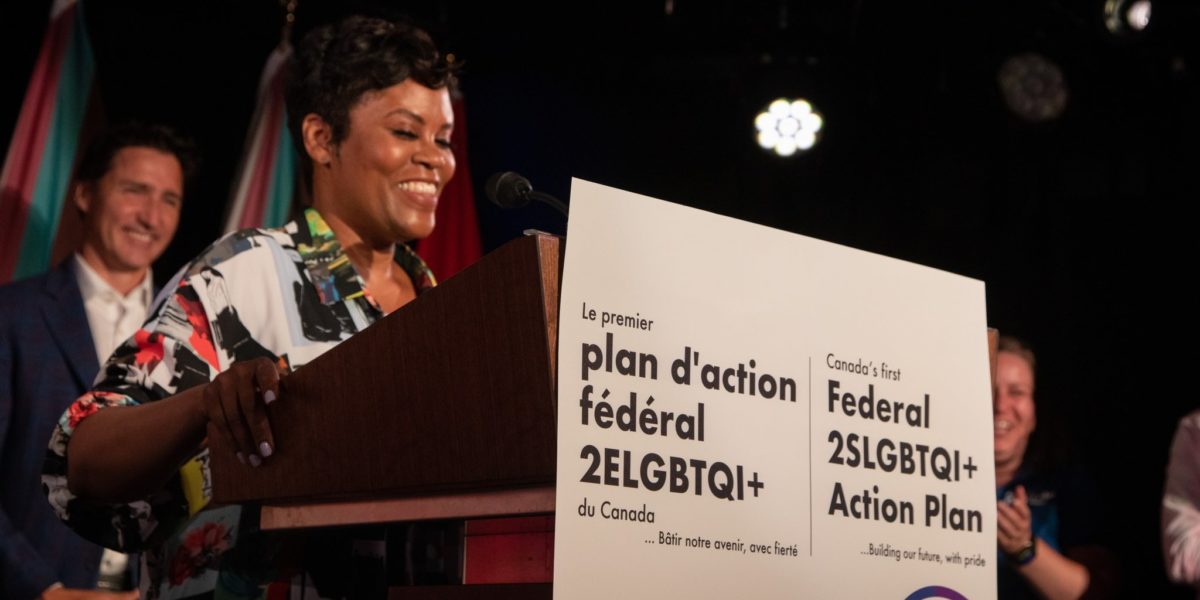For the first time in the country’s history, the Canadian government is dedicating $100 million to create a federal 2SLGBTQI+ Action Plan.
The move comes months after Canada ended the discriminatory gay blood ban, as well as criminalizing so-called “conversion therapy.” It also comes in the wake of a global Monkeypox outbreak that is disproportionately impacting men who have sex with men.
Prime Minister Justin Trudeau announced the historic legislation, also known as Building our future, with pride, on Sunday during a press conference alongside Minister for Women and Gender Equality and Youth Marci Ien. The announcement coincided with Ottawa’s Capital Pride parade and street festival.
The funding, which the federal government committed to in Budget 2022, will see $100 million committed to developing the action plan over the next five years.
Up to three-quarters of the funding is set to benefit 2SLGBTQI+ community organizations that provide services and advocate for their communities.
Of that, $40 million is expected to go towards initiatives that support Black, racialized, and Indigenous 2SLGBTQI+ communities, those with disabilities, seniors, youth, those living in rural communities, and those whose first language is not English or French. The other $35 million is slated to address specific barriers to 2SLGBTQI+ equality.
The plan will also see Justice Canada launch a public consultation, beginning this fall, to discuss criminal law reform issues identified by 2SLGBTQI+ stakeholders, including “the criminalization of purely cosmetic surgeries on intersex children’s gentitalia until they are mature enough to provide consent, modernizing indecency-based offences, and limiting prosecutions of persons who fail to disclose their HIV status before otherwise consensual sexual activity.”
Plan the result of extensive consultations with 2SLGBTQI+ community
The terminology used in the 53-page plan reflects what the federal government describes as “extensive consultations with 2SLGBTQI+ communities across the country” to use the aforementioned acronym. The 2S in front of LGBTQI+, which stands for two-spirit, “places the experiences of Indigenous 2SLGBTQI+ communities at the foreground as the first 2SLGBTQI+ peoples in North America.”
Speaking to reporters Sunday, Trudeau noted the plan will “guide our ongoing work to fight discrimination, to break down barriers, to advance rights, and to build a future where everyone in Canada is truly free to be who they are and love whom they love.
“The strength and the resilience of your community should inspire everyone,” Trudeau said. “We see it in your advocacy, your outreach to vulnerable people and the work you do every day to make your community more inclusive and diverse.”
The message from Ien, who serves as the Member of Parliament for Toronto Centre which includes the city’s historic gay village, was simple: “We got here.”
Ien noted that while the federal government has made many strides in supporting 2SLGBTQI+ Canadians, one thing politicians can’t do is legislate empathy. She pointed out that many people are still afraid to hold their partner’s hand in public, scared someone will see which bathroom they choose to use, flinching when a car drives by and somebody yells a slur at them, and being cut off from their closest friends and family simply for their sexual orientation or gender identity.
“You’ve stood and you’ve risen and you’ve protested and you’ve advocated,” Ien said of 2SLGBTQI+ activists. “And with your help, we’re here.”
But as Ien pointed out, “there is a stark difference between tolerance and acceptance.”
According to the plan, 25 to 40 per cent of homeless youth in Canada are 2SLGBTQI+ and nearly two-thirds of 2SLGBTQI+ students report feeling unsafe at school. Even starker, 2SLGBTQI+ people are more likely to live in poverty, with 41 per cent of 2SLGBTQI+ Canadians earning less than $20,000 per year, as of 2018.
The federal action plan is also set to provide $7.7 million for data collection and community-led policy research that will help inform federal action on 2SLGBTQI+ issues, along with $5.6 million to create awareness campaigns that help break down stigma and end discrimination for 2SLGBTQI+ Canadians.
A ‘game-changer’
For Tyler Boyce, executive director of The Enchante Network, the federal action plan is a game-changer.
The Enchante Network is Canada’s largest network of 2SLGBTQI+ organizations, providing support, advocacy and outreach for more than 200 organizations across the country.
Speaking with reporters on Sunday, Boyce described the plan as “movement building.”
“As a society, we can do many different things,” Boyce said. “And one of the most powerful things that we can do is decide to do things differently.”
Pointing out that hate crimes against queer and trans Canadians is on the rise — particularly affecting racialized communities — Boyce credited Black and Latinx trans women with “[laying] it all on the line for us,” adding that it’s important for 2SLGBTQI+ organizations to honour that historic activism that paved the way for the federal action plan.
“I want to take a moment to recognize that there are so many people who, in my community, didn’t live long enough to see this moment because of the ways that we’ve been abandoned, whether it was during police brutality or whether it was during the HIV/AIDS crisis that is still ongoing to this day,” Boyce said.



